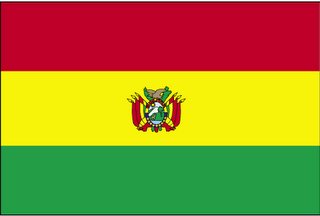Evo in America
This is Morales’ second visit to the Big Apple and while speaking at Cooper Union on Monday night, he offered insight into the movement that elected an indigenous president and continues determined to transform Bolivia. His manner and insight often drew laughter and cheers of solidarity from the audience.
He shared anecdotes from his political beginnings as a coca farmer and labor leader in Cochabamba. Still - almost two years into his presidency - Morales continues to express a degree of suspended disbelief that a man of his humble means could be elected president.
He recalled an ancestral law of, “Don’t Steal, Don’t Lie, Don’t be Lazy” – an Incan concept even greater than common tenants of the nation’s Constitution. In keeping with this tradition, his days in the Presidential Palace often begin at 5 a.m.
One of Morales’ first decrees as president was to cut the salaries of all government officials in order to demonstrate a commitment to battling corruption.
He indicated a willingness to earn less than his monthly salary of 15,000 bolivianos, but Bolivian law prohibits government officials from receiving a higher salary than the President, and he can not ask his colleagues to work for less.
Often criticized in the international media for populist policies, Morales explained that by nationalizing the nation’s hydrocarbon sector, the government’s earnings rose from $300 million to $2 billion in less than 2 years.
He noted that Bolivia’s economy had experienced its first surplus since 1960 - all of this in a nation that is rich in natural resources but historically crippled by corruption.
And while Bolivia is still experiencing growing pains with unresolved structural problems, slow-moving state agencies and difficulties with justice ministers, Morales cautioned against believing news stories that sensationalize the events occurring in Bolivia.
Morales and the MAS party continue forward as opposition parties receive support from the U.S. government – an issue he says should be of concern to U.S. taxpayers who deserve to know where their tax money is being spent.
He also stated that the American public should expel ex-President Gonzalo Sánchez de Lozada, instead of allowing the U.S. government to offer a human rights violator safe haven.
In his most recent meeting with the U.S. Ambassador to Bolivia - where they discussed Iran, visas and mutual cooperation - Morales told Ambassador Goldberg that there must be transparency between the two nations before real cooperation can exist.
He continues his stance that even small countries have dignity and sovereignty and can decide with which countries they will seek diplomatic relations. As such, Morales will host Iran’s President Mahmoud Ahmadinejad in Bolivia on Thursday - where they will discuss bilateral cooperation - much to the consternation of the U.S. and other western nations.
Last year when Morales stood before the General Assembly, he displayed a coca leaf and called for the rights of indigenous people to their culture and traditions as he denounced the international policies that contaminate the environment and permit war.
This year he is expected to speak extensively about the environment and put forth a dialogue that examines the root causes of climate change - namely rapid capitalist development, over- consumption and the concentration of wealth.
And although the words of President Bush and President Ahmadinejad may be generating the most international press and attention, it is likely the words of an indigenous labor leader from a small, landlocked country in the Americas will offer the most food for thought and hope for a more equitable and prosperous future.
Jallalla!
Labels: Evo Morales Bolivia, politics UN United Nations Jon Stewart Daily show



 by the General Assembly of the United Nations, describing it as a historical victory.
by the General Assembly of the United Nations, describing it as a historical victory.







